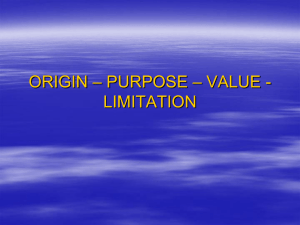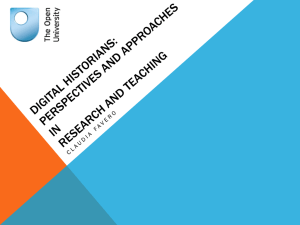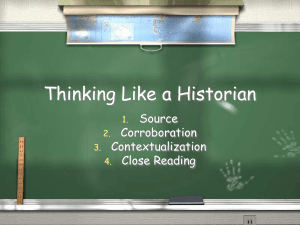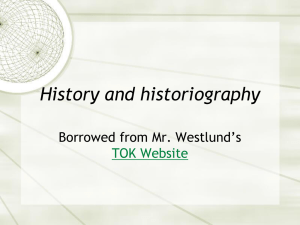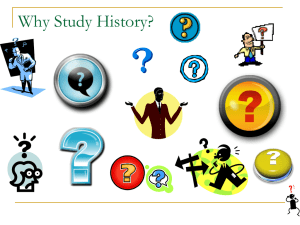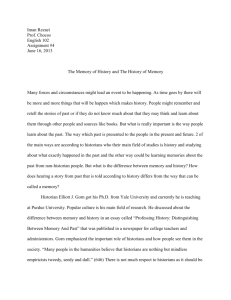Consultancy
advertisement
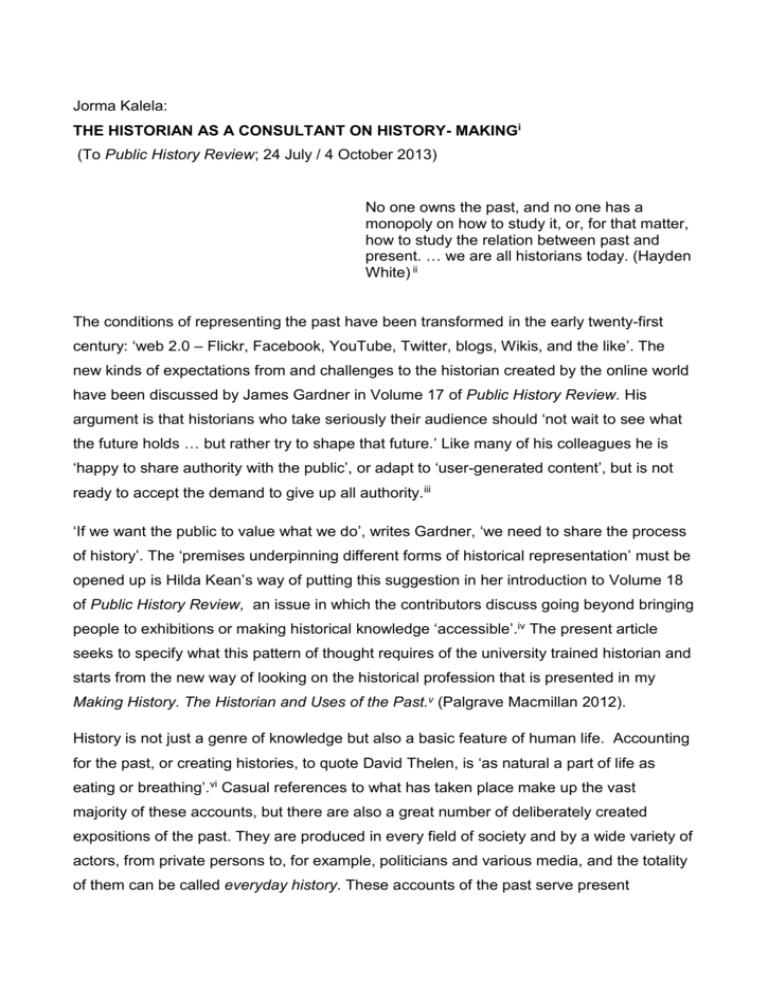
Jorma Kalela: THE HISTORIAN AS A CONSULTANT ON HISTORY- MAKINGi (To Public History Review; 24 July / 4 October 2013) No one owns the past, and no one has a monopoly on how to study it, or, for that matter, how to study the relation between past and present. … we are all historians today. (Hayden White) ii The conditions of representing the past have been transformed in the early twenty-first century: ‘web 2.0 – Flickr, Facebook, YouTube, Twitter, blogs, Wikis, and the like’. The new kinds of expectations from and challenges to the historian created by the online world have been discussed by James Gardner in Volume 17 of Public History Review. His argument is that historians who take seriously their audience should ‘not wait to see what the future holds … but rather try to shape that future.’ Like many of his colleagues he is ‘happy to share authority with the public’, or adapt to ‘user-generated content’, but is not ready to accept the demand to give up all authority.iii ‘If we want the public to value what we do’, writes Gardner, ‘we need to share the process of history’. The ‘premises underpinning different forms of historical representation’ must be opened up is Hilda Kean’s way of putting this suggestion in her introduction to Volume 18 of Public History Review, an issue in which the contributors discuss going beyond bringing people to exhibitions or making historical knowledge ‘accessible’.iv The present article seeks to specify what this pattern of thought requires of the university trained historian and starts from the new way of looking on the historical profession that is presented in my Making History. The Historian and Uses of the Past.v (Palgrave Macmillan 2012). History is not just a genre of knowledge but also a basic feature of human life. Accounting for the past, or creating histories, to quote David Thelen, is ‘as natural a part of life as eating or breathing’.vi Casual references to what has taken place make up the vast majority of these accounts, but there are also a great number of deliberately created expositions of the past. They are produced in every field of society and by a wide variety of actors, from private persons to, for example, politicians and various media, and the totality of them can be called everyday history. These accounts of the past serve present purposes meaning that histories have innumerable functions and are of countless types. The divergent accounts do also influence each other, and my suggestion is that their interaction be called the never-ending social process of history-making. History-making is, in other words, no privilege of historians. True, they are experts but not outside observers; scholarly historians are inescapably involved in the social process of history-making. Their work aims beyond prevailing histories: they seek interpretations that make better sense of the past than the existing ones. Embedded in this effort is another constructivist function: they demonstrate ways to think about the past and how to use it. When demonstrating ‘that’s not how it was’, historians at the same display ‘how the presentation should have been constructed’. Even if they don’t think of themselves as consultants on history-making they act in this capacity. In other words, historians are in two ways active agents in the social process of historymaking. And since their inquiries are signified by the everyday history that surrounds them, trained historians should reflect on their profession in the first place as a cultural institution and only after that in terms of an academic discipline. The research done is directed by its culturally constructivist side even if embedded in it is scholarly criticism of ill-founded and unjustified views of the past that results in the upgrading of prevalent knowledge. When constructing a representation of the past trained historians aim at reconstructionvii. Their effort is distinguished by an effort to recreate the subjective world of the people studied meaning that the goal is a fair interpretation of their actions and thoughts. That is to say, historians reconstruct the past by presenting the people studied in their own terms. However, this scholarly side of the undertaking does not constitute its rationale. Historians aim at calling the audience’s attention to the particular past matters they have selected and arranged in order to demonstrate their present relevance. This cultural idea is the core of their endeavour and it is summarised the historian’s message. The message makes the objective concrete by displaying the study’s significance, that is, it crystallises the fruitfulness of the new knowledge and the lesson embedded in it. To sum up: the specialist produces knowledge that is sustainable, both meaningful and sound. The idea of the dominant, cultural side of the undertaking is to demonstrate what makes the selected past matters significant, bring to light the meanings embedded in them. Still, this effort is justified only if the interpretation produced is sound, if it conveys a fair description of the people studied. In other words, trained historians serve as cultural critics who act simultaneously as consultants on history-making and as referees in the usage of the past. Even if the present article concentrates on the consultancy, it also discusses the ways in which the constructive and the critical sides of the historian’s work are connected to each other. Acting constantly as the referee on one’s own work is the crucial capacity required of a historian. Underlining this characteristic sounds odd to a trained historian since it refers to a self-evident aspect of the scholar’s work. That is why asking ‘what is the point of such a formulation?’ is a justified reaction. The answer conveys the message of this article in a nutshell. Acting as a consultant on history-making also outside the academic world is, when one pauses to think about it, a self-evident aspect of the scholarly historian’s job. It is thinking about the meanings of this capacity rather than new practices that is called for. The historians’ traditional view of their fellow people has been articulated by Johan Huizinga, among others. History, he writes, differs from other disciplines in that its ‘privilege and heavy responsibility is to remain comprehensible to all civilized people’. When the trained historian acts as a consultant on history-making for his/her fellow people s/he takes just one step further; the question is not only of showing how to think of past matters, but also of instructing the purposeful production of histories. This article explores what follows when the expert thinks about this capacity that s/he has even if s/he would deny it: what is implied in thinking about the study of history, as Hilda Kean puts it nicely, ’in the landscape of everyday life’?viii i I am grateful for comments on the earlier versions of this article on one side to Ian Gwinn, and on the other, to Sirkka Ahonen, Jan Löfström and Jukka Rantala. Hayden White: ‘Afterword: manifesto time’. In K.Jenkins, Sue Morgan and Alun Munslow (eds.): Manifestos for History, Routledge; London and New York 2007, 231. ii James B. Gardner: ‘Trust, Risk and Public History: A View From the United States’, Public History Review Vol. 17 (2010), 52-6. iii iv Hilda Kean: ’Introduction’, Public History Review Vol. 18 (2011), 1-11. v Palgrave Macmillan, Basingstoke 2012. ’A Participatory Historical Culture’, in Roy Rosenzweig and David Thelen, The Presence of the Past: Popular Uses of History in American Life, Columbia University Press; New York, 1998, 190. vi vii Paul Ricoeur: Time And Narrative, Volume 3,The University of Chicago Press; Chicago and London, 1988, 142-144. See also Raphel Samuel: Theatres of Memory, Vol. 1: Past and Present in Contemporary Culture (Verso; London and New York 1994), 434-435. Kean: ’Introduction’ in The Public History Reader, ed. by Hilda Kean and Paul Martin. Routledge; London and New York 2013, xx. viii
